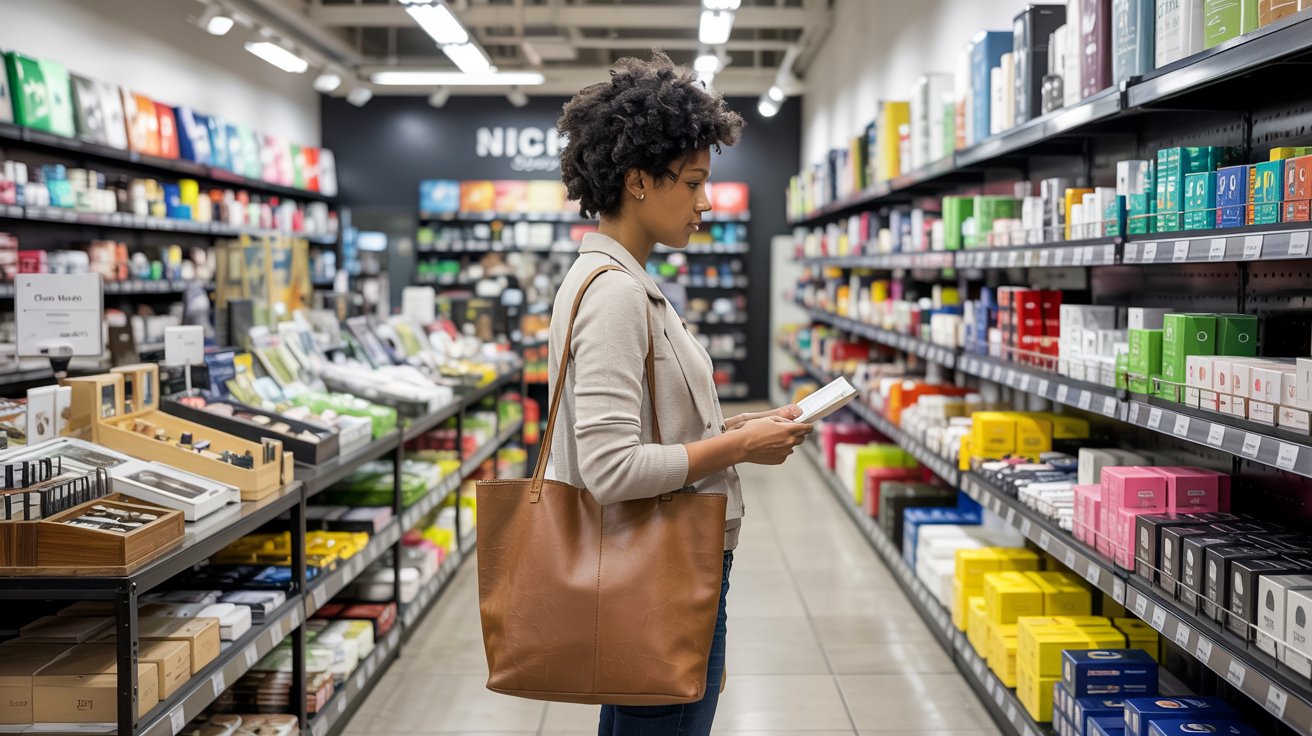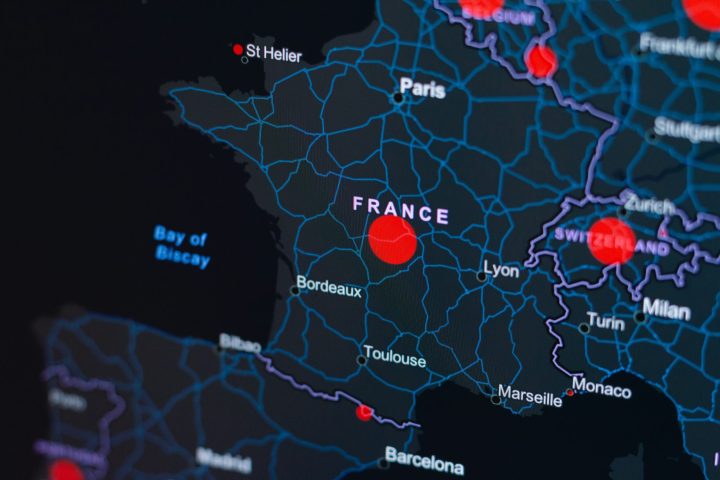Top retail companies in DACH
Written by
Kinga EdwardsPublished on
Dive into the world of DACH’s top retail companies! Find out who leads the market and what strategies drive their success in this competitive landscape.

What do the top retail companies in DACH have in common?
They’re fast to adapt, sharp with strategy, and deeply connected to what their customers actually want. Germany, Austria, and Switzerland may share a region, but their retail scenes each bring something unique to the table. Together, they make DACH one of Europe’s most exciting markets for growth, innovation, and customer loyalty.
In this article, based on BoldData insights, we spotlight the top players shaping retail in DACH. You will find many names setting the pace in 2025, and offering plenty of lessons for the rest of us. So, let’s jump in, and meet the details.
Why retail in DACH is worth watching
Imagine a region where tradition meets innovation, and consumers are both discerning and digitally savvy. That’s the DACH region for you.
Germany, the largest economy in Europe, continues to be a powerhouse in retail. In 2024, German e-commerce sales experienced a slight increase for the first time since 2021, growing by 1.1% to €80.6 billion. Higher savings and increased consumer confidence drove it. The positive trend is expected to continue, with projections indicating a 2.5% growth in 2025.
What about Austria and Switzerland? While smaller in population, they boast high purchasing power and a strong inclination towards quality and sustainability. Switzerland’s projected e-commerce revenue, for instance, is $15.23 billion in 2025 with a growth rate of 10.53%.
Moreover, consumers in the DACH region are going into online shopping more. 55% of them research products online through platforms like Amazon or eBay before purchasing. They’re scrolling on the train, checking prices in-store, and buying straight from TikTok ads.
Mobile commerce and social shopping are just everywhere, and retailers in DACH are catching on fast. They’re stepping up their digital game, making sure their products look great on any screen and their checkout flows don’t slow anyone down.
15 top retail companies in DACH to know
The DACH region is packed with retail businesses. Some are household names across Europe. Others dominate in highly focused categories like DIY, food, or fashion. Here’s a closer look at them. And if you’re a smaller brand? There’s plenty you can learn from the way these leaders move.
OBI Bau- und Heimwerkermärkte Systemzentrale GmbH
Category: Home improvement & DIY
Consistency with flexibility, that’s what keeps OBI ahead. It’s a major player in home improvement across Europe, which serves both seasoned DIYers and first-timers with tools, garden gear, home fittings, and renovation essentials. What makes OBI stand out is its balance between in-store expertise and growing online presence. The Swiss operation has focused heavily on customer service and product variety. Their ability to make big-box retail feel local is a strategy worth studying.
Other retailers can just take notes on how they adapt layout and offers per region.
Deichmann SE
Category: Footwear retail
Deichmann is Europe’s largest shoe retailer, and it all started in Essen. The brand has built trust through affordable pricing, massive selection, and family-friendly formats. Their product range includes everything from sneakers to formal wear, often under exclusive house brands. Deichmann moves fast, too—they’re known for smart inventory management and trend-driven buying. In recent years, they’ve ramped up e-commerce and mobile shopping, keeping pace with digital shifts.
What competitors can learn from Deichmann is operational efficiency at scale. When you get the basics right, growth comes naturally.
Billa Aktiengesellschaft
Category: Supermarket & grocery
Billa is a beloved supermarket chain in Austria with deep roots and wide reach. It’s known for quality groceries, regional sourcing, and strong brand recognition in everyday shopping. What really makes Billa tick is its community focus – local products, seasonal campaigns, and long-term loyalty efforts. Their stores are well-placed, accessible, and consistent in experience. As part of the REWE Group, Billa benefits from major retail infrastructure without losing its local feel. They’ve also taken big steps in sustainability, which continues to resonate in the DACH market.
The tip from Billa? Focused assortments and regional pride still matter.
Rudolf Schär AG
Category: Specialty food (gluten-free)
Rudilf Schär, based in Thal, serves a niche but fast-growing customer base across Europe and beyond. What sets Schär apart is deep product expertise, combined with rigorous quality control and health standards. They’ve built strong trust among people with dietary restrictions – a group that values transparency and safety. Schär’s packaging, messaging, and innovation pipeline are all tightly aligned with that mission.
For smaller food brands, it’s proof that specialization wins. Build deep, serve well, and don’t try to be everything for everyone.
GLOBUS Handelshof St. Wendel GmbH & Co. KG
Category: Hypermarket & general merchandise
GLOBUS blends the scale of hypermarkets with the soul of a regional favorite. Their stores mix groceries, household goods, electronics, and even DIY. Thus, they offer customers a full-day experience under one roof. What’s impressive is how GLOBUS stays relevant with local sourcing, in-store bakeries, and strong private labels. They also run their own logistics and meat processing facilities, ensuring quality at every level. In recent years, the chain has leaned into digital services like click & collect and meal planning apps.
toom Baumarkt GmbH
Category: Home improvement & DIY
toom is one of Germany’s leading DIY and home improvement retailers, with a presence in over 300 locations. Their in-store layout is intuitive, with clear guidance for both professionals and hobbyists. toom has also invested in digital tutorials and project inspiration tools, so customers can start and finish jobs confidently. The brand is part of the REWE Group, which helps them streamline logistics and pricing. What’s unique is how approachable they make complex projects feel. They don’t just sell supplies—they guide people through the process.
That kind of value-added support is something smaller retailers can absolutely replicate on a simpler scale.
Bike World AG
Category: Bicycle & outdoor Sports
Bike World also belongs to the top retail companies in DACH. It brings high-quality bicycles, gear, and expert service to Swiss customers who love the outdoors. Their stores carry everything from e-bikes to road racers and kids’ models – paired with repairs, upgrades, and advice. Their brand connects especially well with weekend cyclists and performance enthusiasts alike. Their staff are trained cyclists themselves, which makes the experience personal and authentic. The Zurich flagship location has become a go-to for gearheads and casual bikers alike.
Any brand looking to scale trust should study how Bike World ties product knowledge to customer passion.
Société coopérative Migros Valais
Category: Supermarket & regional co-op retail
Migros Valais is part of the larger Migros cooperative, but it brings a strong local flavor to its operations in the Valais region. This branch of Migros emphasizes regional produce, local partnerships, and French-speaking Swiss culture. What sets it apart is how deeply rooted it is in community needs. They aren’t just selling food but supporting public health, education, and family life. The product assortment reflects those values: practical, healthy, and fairly priced. Migros Valais also runs its own donation and loyalty programs, which strengthen emotional bonds with customers.
Digital services like Migros Online and self-scanning apps are fully integrated here. Even in a big group, they manage to stay truly local.
Hofer Kommanditgesellschaft
Category: Discount supermarket
Hofer is Austria’s answer to ALDI—and it operates with the same focus on simplicity, speed, and value. You won’t find hundreds of options in each category. Instead, Hofer curates essentials and rotates special buys weekly to keep things fresh. This no-frills model allows them to offer competitive prices while maintaining strong product quality. The layout is consistent, easy to navigate, and built for efficiency. Hofer’s private label products are a hit with cost-conscious shoppers.
Smaller shops can learn how simplicity creates clarity—and clarity builds trust fast. It’s not always about offering more. Sometimes, it’s about offering better.
PENNY Markt GmbH
Category: Discount supermarket
PENNY offers quick shopping for everyday essentials and has carved out a unique spot between convenience and cost. The stores are compact but well-stocked, with tight assortments and strong brands. PENNY has been especially proactive in upgrading store design and signage to improve the shopping experience. Also, their marketing strategies strike a smart balance between deals and emotion. Moreover, PENNY runs seasonal campaigns that connect deeply with family shoppers, especially around holidays.
Their approach to sustainability (like reducing packaging and expanding plant-based lines) is increasingly visible.
GALERIA Karstadt Kaufhof GmbH
Category: Department store
GALERIA is known for multi-category shopping in central city locations (clothing, cosmetics, home goods, and more). Over the years, GALERIA has faced pressure from digital-first competitors, but it’s fighting back with modernized stores and smarter merchandising. They’ve leaned into private labels and exclusive brands to bring something different to their aisles. GALERIA is also testing new formats, like lifestyle zones and in-store experiences, to give shoppers a reason to stay longer.
Smaller retailers can watch how they’re rethinking physical space in a post-e-commerce world.
Douglas GmbH
Category: Beauty & personal care
Douglas is a beauty retail leader with a strong online presence and over 1,800 stores across Europe. Their roots are in fragrance, but they’ve expanded into skincare, wellness, and cosmetics, mixing high-end and affordable brands. What sets Douglas apart is its aggressive e-commerce strategy, including their own app, loyalty program, and subscription models. They were quick to shift focus during the pandemic, investing in digital and DTC before many others. Their branding is sharp, modern, and very tuned into Gen Z and millennial tastes.
You are a small brand in the lifestyle category? So study how Douglas blends inspiration with infrastructure.
IKEA Deutschland GmbH & Co. KG
Category: Furniture & home goods
With nearly 50 stores and strong e-commerce growth, IKEA Germany is a case study in hybrid retail done right. The experience goes far beyond flat-pack furniture. It’s storytelling, family-friendly cafés, and rooms that make people dream. IKEA’s digital experience in Germany continues to evolve, with online planning tools, augmented reality, and strong click-and-collect services. Their supply chain is highly optimized, but the brand still feels personal, thanks to thoughtful in-store design and seasonal collections.
IKEA understands that customers want solutions, not just products. That mindset is worth borrowing at any size.
Migros Online SA
Category: Online grocery
Migros Online is the digital shopping arm of Switzerland’s largest retailer, Migros. It offers full grocery delivery, click-and-collect, and curated shopping experiences for busy Swiss consumers. The platform stands out for its intuitive design, loyalty integration, and strong logistics backbone. In a country where convenience matters and time is tight, Migros Online solves a real problem. Their ability to merge grocery, wellness, and household products in one consistent interface is impressive.
If you’re running an e-commerce shop, this is a masterclass in making digital feel effortless.
Genossenschaft Migros Basel
Category: Supermarket & regional co-op retail
Migros Basel manages grocery stores, take-away outlets, and even community programs across the Basel region. What makes Migros Basel different is its commitment to culture and connection – funding local projects and sponsoring events that go beyond commerce. The product range includes everyday essentials, health-conscious options, and exclusive local goods. Migros Basel also integrates digital touchpoints without overcomplicating the shopping journey.
Their customer base trusts them because they keep evolving without losing sight of local needs. And that kind of long-term thinking is something any retailer should admire.
What smaller brands can learn from the leaders?
Big firms might have strong budgets, but that’s not why they win. What really sets the top retail companies in DACH apart is how sharp they are about where to show up, what to say, and how to keep people coming back.
Here’s the thing: smaller brands have the same tools. You just need to use them smartly.
First, the best retailers in DACH are obsessed with their customer experience. That means smooth mobile sites, fast delivery, and real support when something goes wrong.
➡️ You don’t need 100 employees to make that happen – you need clear priorities and the right tech.
Second, they’re great at storytelling. Whether it’s a sustainability message, a behind-the-scenes video, or a creator partnership, they know how to stay in people’s minds.
➡️ You can do this, too. Start small. Show your face. Let people into your world.
Third, they’re not afraid to test. New ad format? Try it. Unexpected audience? Talk to them. The leaders don’t wait for perfection—they launch, learn, and tweak.
Being small means you can move fast. And in a market like DACH, that speed is your secret weapon.
Final thoughts
Every brand above succeeds by knowing exactly who they serve. They don’t try to win everyone. They focus, listen, and build systems around what their audience actually wants. That clarity? It’s priceless. And it shows up from product mix to store layout to how they run ads.
If you’re growing a retail business, take this as your reminder to start with focus. Learn your customers better than anyone else. Then build around their habits, their needs, and the way they want to shop.
That’s how smart brands grow: step by step, decision by decision.
***


